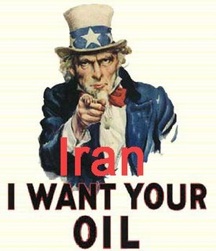
Aside from the domestic implications of the post-electoral mass protestations in Iran, there are profound international ramifications. On July 17, after a month and a half of seclusion, for the first time former President Ayatollah Hashemi Rafsanjani, one of Iran’s wealthiest men, publicly known as “the Shark” regarding his financial transactions that led to his families’ massive accumulation of riches during his tenure as President of Iran, led Friday prayers at Tehran University. In his sermon, Rafsanjani stressed on the impending crisis, which in his opinion has engulfed the country, implying that it was caused by the way the government of Ahmadinejad has handled the social outbursts. As a reaction to this criticism, the pro-Ahmadinejad and Khamenei forces in attendance began chanting “Down with the U.S.A.!”
Suddenly, as a clear expression of their position, the pro-Rafsanjani-Mousavi crowd responded by yelling out “Down with Russia!” and “Down with China!” In the entire ten-day unrest, nothing more than this brief episode made the domestic and international class positions of the two camps clearer.
This fact has been so far undeniable that one of the two main characteristics of the ’79 Revolution was its anti-western imperialism content. In this particular religious gathering at least a substantial section of the pro-bourgeois nationalists let the cat out of the bag and pointed at China and Russia as two enemies of Iran, at least in their eyes.
Were the ideological leaders of the reformist crowd aware that China and Russia have supported Iran, more or less, on the nuclear power plant issue, on the enrichment of uranium and have softened the impacts of the U.S./U.K.-promoted UN Security Council sanctions against Iran? The answer is a definite yes. Did the reformists along with the pragmatic conservatives know that Iran has expressed its strong desire to join, as a full member, the Shanghai Cooperation Organization (SCO)? No doubt they knew that unlike the U.S. and Western Europe, China and Russia immediately recognized the legitimacy of Iran’s presidential election and congratulated President Mahmoud Ahmadinejad for his victory. With a high degree of probability they knew this very well. Did the neo-liberal opposition know that their crucial link in the White House, Zbigniew Brzezinski, has been advising President Obama about the essentiality of breaking up the Beijing-Moscow-Tehran relations?
As we all know, China, Russia and Iran, along with many countries in Africa and Latin America strongly advocate that the current uni-polar world order has to be replaced by a multi-polar arrangement, which would enhance the role of other nations, especially a multitude of smaller countries in the running of world affairs. Furthermore, these three countries have seriously enacted the policy of replacing the U.S. dollar, as a sole world reserve currency with a new basket of currencies that would reduce the arbitrary pressure of the U.S. dollar on other currencies.
It is relevant to know that in the recent G8 Summit held July 8-10, 2009 in Aquila, Italy, both China and Russia introduced suggestions for diversifying the global currency system in the future to replace the U.S. dollar as the single world reserve currency, much to the dismay of the Obama Administration.
The slogans “Death to Russia” and “Death to China” clearly demonstrated the neo-liberal economic platform of the reformists who strongly seek to transfer a major part of the control of the Iranian economy from public to private, on one hand, and remove the encumbrances in the way of U.S. Big Oil from reaching the Iranian oil reserves in the Caspian Sea. In this connection, the Russia-Iran-Venezuela cooperation has been a nightmare for Washington – from G.W. Bush to Barack Obama. Together, Russia, Iran and Venezuela have 25% of the world’s proven oil reserves. The same goes for gas reserves and production.
No wonder that in the pre-election presidential debates, Mousavi, spokesperson for Iran’s integration into the western world market, ridiculed President Ahmadinejad for his policies of economic and political cooperation with Latin American and Asian countries, but especially for his views on the downfall of the old world economic and international order. There is no doubt that a section of the Iranian bourgeoisie, symbolized by Mousavi, Rafsanjani, clerical groupings, the top echelon in the banking and insurance companies, and the high-placed bureaucrats and technocrats, have been opposed to Iran’s political and economic policies of strengthening ties with China, Russia, Venezuela, Cuba and Nicaragua.
Thus the anti-China-Russia cry heard in the Friday prayers when Rafsanjani spoke was an expression of the needs of the Iranian comprador bourgeoisie in joining the major western oil, financial and industrial corporations.
AUTHOR
Ardeshir Ommani is an Iranian-born writer and an activist in the U.S. anti-war and anti-imperialist struggle for over 40 years, including against the Vietnam War, and now the Iraq war. During the past seven years, he has participated in the U.S. peace movement, working to promote dialogue and peace among nations and to prevent a U.S.-spurred war on Iran. He holds two Masters Degrees: one in Political Economy and another in Mathematics Education. Co-founder of the American Iranian Friendship Committee, (AIFC), he writes articles of analysis on Iran -U.S. relations, the U.S. economy and has translated articles and books from English into Farsi, the Persian language. Please visit AIFC’s website to learn more about Iran and Global issues at www.iranaifc.com . Two of his recent articles, “Ten Tumultuous Days” can be viewed at: www.mathaba.net, and “Change to a Multi-Polar World” in www.TehranTimes.com.






